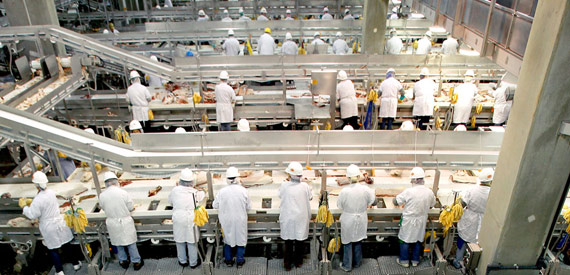Looking back to before Nicki’s diagnosis (and our wake up call), we were sick. It’s easy to see now, but we were completely ignorant to it.
Both of us had bad eating habits. We both struggled with joint pain, skin problems, tension headaches, and more. Marshall had high blood pressure, high cholesterol, high liver enzyme counts, and chest pain and was overweight. Nicki had…well…cancer.
The thing is, we thought we were healthy! We bought low carb yogurt, ate fortified cereals, took a myriad of vitamins and supplements (omega 3, 6, and 9!!), and drank diet soda (even made our own…). We bought stacks and stacks of healthy choice meals for lunches, made sure to find the low sodium /low-carb/low-fat versions of soups and canned vegetables, and counted calories on a regular basis. We were running, working out, taking the stairs…by food industry standards, we were “healthy!”
Industrial Food is…problematic
Then we woke up. More appropriately, we were jarred awake – in part by a few documentaries and books, but mostly from Nicki’s cancer and LFS diagnoses and recommendations from her doctors. Industrial food is processed, broken down, refined to individual elements, and forced back together with binding agents, chemicals, and then injected with “healthy additives” that were already in the original ingredient.

Think about that. Enriched white flour is a perfect example of this. That came into the market because nutritionists realized that bleached white flour (made by first removing the nutrient-rich germ and endosperm of the wheat kernel) contained essentially no nutritional value beyond simple carbohydrates. Instead of going back to the original whole grain form, they started to just “enrich” the nutrient-less flour by adding back the nutrients that were in the first place.
Nutrients are Nutrients, right?
“Okay,” you might say, “but the nutrients are being added back, so it’s just as good, right?” On the surface, it might seem that way. Unfortunately, there are two main problems with that.
The first problem is that food is best in its natural and whole state. In this case, if wheat is admittedly most nutritious in it’s whole form, why go through the steps to take them out, only to put them back in? Imagine someone taking apart their car to the individual components, only putting the frame, engine, transmission, brakes, seats, wheels, and steering wheel back together, only to realize they forgot to put in the seat belts, lights, mirrors, windows, roof, hood, etc, etc. Could you drive a car made of the barebones components? Yes. Would you want to? Maybe. Would you feel safe or comfortable compared to a proper car? Unless you’re Mad Max, most likely not.
Yes, there are plenty of foods that take on added or different nutritional value when they are cooked in a certain way, transformed through fermentation, or added to another food to enhance the total value of nutrition. Wheat is one of these types of foods – bread that is made with natural fermentation is much more nutritious than the sum of its parts by themselves. Turmeric is an incredible superfood, but it’s made even more powerful when cooked in oil with pepper.
The second problem is that we don’t fully understand nutrition to the level that is really required to confidently pick and choose what nutrients are needed and to what level. As Michael Pollan said, “Nutrition science is where surgery was in about 1650, you know, really interesting and promising, but would you want to have them operate on you yet? I don’t think so.”
To put it bluntly, we don’t know squat about nutrition. At some point, we may be able to determine what acids, proteins, anti-oxidants, etc that we need, what ones we don’t, and at what levels, but right now we aren’t even close. Letting Company A make the determination that enriched white bread is good for us is equivalent to me letting you cut me open and play around with my organs. No thanks.
Processed = Money
So why process food?

The answer is that profitability increases the more that a food or ingredient is processed. Food isn’t processed for health reasons – that is essentially proven by the abundance of processed foods with added nutrients. There is no nutritional benefit to go through the process to create enriched flour, fortified cereals, “now contains more ____” orange juice, and countless others. Processed foods continue to exist because there’s more money to be made in processing food than simply putting them in their natural forms on the shelf in the grocery store.
To be fair, technically cutting, chopping, grinding, and even simple boiling are forms of processing, but don’t get literal here – that’s not what where we’re going wrong with our food in the homes across America. In truth, the problem is that there isn’t enough cutting, chopping, grinding, and boiling going in homes across America. As a society, we are cooking less and less, and have steadily cooking for less time a day and less often a week for decades. Instead, we’re letting Mama Corp, LLC, Sub-brand of Petrol Global, and What To Do With All This Corn, Inc. do it for us.
And therein lies the biggest problem of all – relying on companies, who rely on profits, to determine our health is a losing agreement for consumers. Ultimately, corporations (with limited exceptions, mind you) are not thinking about your long term health, especially when it gets in the way of their profits being on the right side of the ledger.
We have to be the judges and protectors of our own health and our own food. It was when we realized that – and our wake up call – that we started taking action and taking back the control of our lives.

